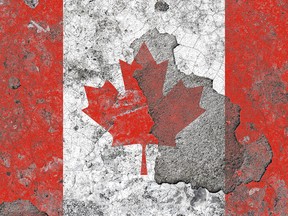Kevin Carmichael: If country’s workforce is coping with low-grade PTSD, there aren’t any simple levers policy-makers can pull

Article content
If you (re)read The Plague earlier in the pandemic, then you were ready for what we’re going through now.
“Rieux and his friends now discovered how tired they were,” Albert Camus said of his protagonist after the quarantine had dragged on longer than anyone had ever imagined. “Dr. Rieux noticed it when he observed the steady growth of a strange indifference in himself and in his friends,” he continued. “Men who up to now had shown such a lively interest in any news about the plague, no longer bothered with it.”
We’re well into what the late psychiatrist Beverley Raphael would have called the “disillusionment” phase of the COVID-19 disaster. The “heroic” stage, when we were all in this together, is a distant memory, while the “honeymoon” phase — that blissfully naive summer of 2020 when a V-shaped recovery briefly looked possible — feels like a fever dream.
The final destination on Raphael’s psychological mapping of the human response to disasters is “reconstruction,” which tends to begin around the first anniversary of the moment when everything changed. And, sure enough, if you squint, as Bank of Canada governor Tiff Macklem did this week, you can see better days on the horizon.
Advertisement
This advertisement has not loaded yet, but your article continues below.
Article content
“We expect a solid rebound in the immediate months ahead,” he said in a speech on Feb. 23. “With vaccinations expected to ramp up, we can be more confident in sustained strong growth through the second half of the year and into next year.”
Still, the governor conceded, the virus and its variants could yet wreck his optimistic forecast. For now, uncertainty reigns, meaning frustration and anxiety do, too. That’s a societal problem, first and foremost, but one that also threatens the economic recovery. Yet our fragile mental health is rarely discussed in economic terms.
“There’s a lot of consensus that we are living through a low-grade trauma,” said Amanda Matejicek, a Mississauga, Ont.-based coach who has a PhD in organizational psychology.
There’s a lot of consensus that we are living through a low-grade trauma
Amanda Matejicek
Think about what that means. About 20 per cent of Canadians have been diagnosed with depression, according to a poll that Mental Health Research Canada commissioned in December — the highest level the group has recorded.
The reconstruction phase of disaster recovery is no picnic. It describes the period when the human brain comes to grips with what has happened and begins processing the grief. Things will start to feel better, but there also will be setbacks.
“The impact of trauma doesn’t recede once the traumatic event recedes,” said Tatijana Busic, a Toronto-based psychologist. “In fact, once a traumatic event stops, you see people develop PTSD months, even years, later. We haven’t seen that yet, because we still are in survival mode.”
Advertisement
This advertisement has not loaded yet, but your article continues below.
Article content

Many of us who avoid depression will continue to grind, like Camus’ heroes. To be sure, there is something romantic about the thought of the 5.4 million Canadians working from home in January pushing through the final stage of the pandemic together. But it won’t be especially productive if we’re all doing it in a fog. We’ll be an unhappier society. We’ll also be a poorer one.
Some 500,000 Canadians were already unable to work on any given day in 2019, according to Bryan Benjamin and Charles Boyer at the Conference Board of Canada. The cost of treating depression and anxiety had risen to about $50 billion a year, while the opportunity cost of lost productivity was about $30 billion annually.
The situation now is, no doubt, worse.
“We’re seeing the exhaustion,” Matejicek said. “We’re seeing the burnout. We’re seeing people trying to keep going even though they are starting to experience the impacts of the stress, the pressure.”
We’re seeing the exhaustion. We’re seeing the burnout
Amanda Matejicek
It’s broadly understood that there’s a problem. The issue is whether we’re sufficiently equipped to deal with it.
The men and women who have their hands on the levers of power are accustomed to responding to more concrete threats.
If the central bank’s money creation and Finance Minister Chrystia Freeland’s deficits spark runaway inflation, then Macklem will simply jack up interest rates until order is restored. It would be painful, but it would work.
But if a critical mass of the country’s workforce is coping with low-grade post-traumatic stress disorder, there aren’t any simple levers that policy-makers can pull.
Advertisement
This advertisement has not loaded yet, but your article continues below.
Article content
“It’s an important concern, and in some ways, one that might get lost in everything else that is going on around COVID-19,” Gordon McKenzie, chief executive of Saskatoon-based potash exporter Canpotex Ltd., said in an interview.
“We’re getting COVID fatigue from a long year of working remotely or working from home. A lot of people suspected COVID would be over within 2020. It’s not over. The mental-health side of that is even more important now than it was a few months ago.”

The House of Commons Finance Committee earlier this month made 145 recommendations to add to the next budget. The first was to “develop and implement a long-term mental health COVID-19 recovery plan to ensure all Canadians — especially the most vulnerable — can access the care they need, no matter where they live.”
The federal government last year said it would spend $10.2 million on research related to how COVID-19 might be affecting mental health and substance abuse.
I’m not anti-government, but we’re in trouble if Canada’s business leaders leave this issue to the politicians, as many of them are wont to do when faced with sensitive matters.
The public sector is having a hard enough time getting us vaccinated. The mental health of the working population is a threat that employers and shareholders must confront.
There is reason to worry that Corporate Canada may not be up for it. Only about third of Canadian companies have mental-health strategies, according to a study by Deloitte. There’s also plenty of anecdotal evidence that the business elite just don’t get it.
Advertisement
This advertisement has not loaded yet, but your article continues below.
Article content
For example, dozens of big companies took money from the federal government’s emergency wage subsidy while they continued to pay dividends and, in some cases, repurchased shares. Those companies said they were entitled to do so, and that they had a responsibility to take care of their shareholders.
But that was never the point. People are angry because wealthy executives and shareholders refused to sacrifice along with everyone else. Studies show that feelings of inequity are among those that erode our mental well-being.

A quarter of Canadian workers consider quitting their jobs as stress levels shoot up

Millennials grow more resentful towards older generations as restrictions, economic fallout hit them harder

Adapt, endure and expand: How Black entrepreneurs are handling the challenges posed by the pandemic

Almost half of working Canadians say they need mental health support — and it’s hurting our productivity
Such callousness on the part of management might be unconscious. Many corporate boards are made up of semi-retired, rich and powerful people who may not have learned much about the intricacies of mental health on their way to the top.
“We don’t teach agile emotion regulation and we don’t teach agile relationship dynamics,” Matejicek said on a Zoom call from her garage, where she and Busic had decided to meet so they could make plans for their counselling and coaching startup, People in Business Inc., at a safe distance.
Advertisement
This advertisement has not loaded yet, but your article continues below.
Article content
They think business schools have left today’s leaders ill-prepared to deal with the mental well-being of their organizations, if only because psychology has advanced so much since Boomers and Generation Xers got their MBAs.
“Our business leaders don’t have the tools they need to effectively engage the humans they have,” Matejicek said. “They know the processes. They know the reward systems. The bonus systems. The ways of creating engagement. They don’t know how to manage the human dynamics.”
The situation isn’t hopeless.
Sonja Volpe, who leads Paris-based BNP Paribas SA’s Canadian unit, started adding new programs related to mental health in May. She expanded the benefits program to include a tele-health service that provides access to therapists, makes a point of holding weekly meetings with smaller staffing groups where the point is simply to talk, and hands out extra vacation days.
One overarching goal is to make sure BNP employees learn to create space. “You have to have lunch,” Volpe said.
McKenzie did similar things at Canpotex. Like Volpe, McKenzie said he’s made a point of hosting regular virtual townhalls to keep staff in Asia, Brazil and Canada connected. He also put an emphasis on results, as opposed to time served at their desk, in hopes of encouraging people to power off their computers, and he tripled the amount of money that employees can claim on psychologists.
These are small things, but if enough leaders do likewise, it could make a difference.
“You don’t have to be Shakespeare,” Busic said. “Just stop and say hello to people. The value of that is tremendous.”
Financial Post
• Email: kcarmichael@postmedia.com | Twitter: CarmichaelKevin
Our fragile mental health is the hidden threat to the economic recovery
2021-02-26 22:29:35




